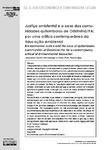Justiça ambiental e o caso das comunidades quilombolas de Oriximiná/PA: por uma crítica contemporânea da educação ambiental

View/
Use this link to cite
http://hdl.handle.net/2183/22458
Except where otherwise noted, this item's license is described as Atribución-CompartirIgual 3.0 España
Collections
Metadata
Show full item recordTitle
Justiça ambiental e o caso das comunidades quilombolas de Oriximiná/PA: por uma crítica contemporânea da educação ambientalAlternative Title(s)
Environmental justice and the case of quilombolas communities of Oriximiná/Pa: for a contemporary critical of environmental educationDate
2017Citation
Ambientalmente Sustentable, 2017, 23-24: 281-296. ISSN: 1887-2417
Abstract
[Resumo] O artigo pretende elucidar questões relacionadas ao pensamento ecológico contemporâneo, filosófico, antropológico e social relacionado à Justiça Ambiental, trazendo para o debate o caso das comunidades de Oriximiná/PA junto com uma profunda crítica aos paradigmas dominantes do conhecimento ambiental e da própria Educação Ambiental. A investigação aponta que a justiça ambiental, assim como, a educação ambiental se estabelecem no espaço que é do conflito, da disputa pela reapropriação da natureza e da cultura, onde natureza e cultura resistem frente à imposição de valores e processos ao se transformarem em valores de mercado. No Brasil, as “populações tradicionais” vêm sendo ao longo de décadas, deslocadas de suas terras para dar lugar a represas, projetos de mineração, agricultura em grande escala, construção civil, turismo de massa, retirada de madeira e rodovias, muitas vezes com base no paradigma da “propriedade”. [Abstract] The article aims to elucidate issues related to contemporary ecological, philosophical, anthropological and social thinking related to Environmental Justice, bringing to the debate the case of the communities of Oriximiná /PA, Brazil, together with a deep critique of the dominant paradigms of environmental knowledge and Education itself Environmental. The investigation points out that environmental justice, as well as environmental education are established in the space that is the confict, the dispute for the reappropriation of nature and culture, where nature and culture resist the imposition of values and processes as they become values of the market. In Brazil, “traditional populations” have for decades been displaced from their lands to give way to dams, mining projects, large-scale agriculture, construction, mass tourism, logging and Basis of the “property” paradigm
Keywords
Justiça ambiental
Educação ambiental
Environmental justice
Environmental education
Educação ambiental
Environmental justice
Environmental education
Rights
Atribución-CompartirIgual 3.0 España
ISSN
1887-2417






